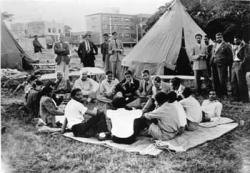
Published date
9 July 1939
In July 1939 at a meeting of 6,000 Indians, held at the Indian Sports Ground in Johannesburg under the chairmanship of E. I. Asvat, a decision was taken to launch a Passive Resistance Campaign (as decided upon at the earlier meeting of 7 May) on 1 August 1939. The campaign was in response to the South African governments repressive against anti-Indian legislation. A 'Council of Action' for the campaign was set up with Dr. Yusuf Dadoo as chairman. India declared its support for the intended the campaign; however, following a request by Mahatma Gandhi, Passive Resistance was only implemented in June 1946, as Gandhi believed that an honourable settlement could still be achieved. By July of 1946 Passive Resistance protests had engulfed Natal resulting in police brutality against the resisters. On 8 July 1946 hundreds of resisters were arrested and appeared before court - some on as many as five different charges. The government attempted to side-step the real issue by charging resisters under the old 'Natal Law of Trespass'. The imprisoned Resisters were fined £5 each. They were told that if they did not pay their fines, their property would be confiscated. No one, however, paid the fine. The 'Riotous Assemblies Act' was invoked against the leaders of the movement, and they were given long terms of imprisonment.
References
"Passive Resistance Campaigns in South Africa 1906-1989", [online] Available at: sahistory.org.za [Accessed on 1 July 2009]|Dadoo, Y., (1968) 'Yusuf Dadoo, fromSouth African history online, [online], Available at: sahistory.org.za [Accessed on 1 July 2009]|SAIC, 'South African Indian Congress', [online] Available at: sahistory.org.za [Accessed on 1 July 2009]